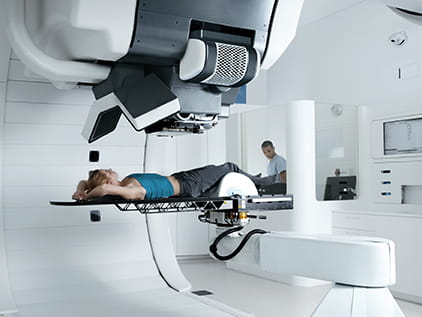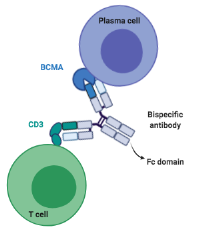Lymphoma Treatment
If you have lymphoma, you will find the leading specialists you need at The University of Kansas Cancer Center. Our interdisciplinary team of oncologists and hematologists have years of experience treating people with all types of lymphoma.
Lymphoma treatment options
The most common treatment for lymphoma is a combination of chemotherapy and radiation therapy.
Chemotherapy and radiation kill cancer cells and other fast-growing cells. However, some therapies are able to target and kill only specific lymphoma cells. Usually, these treatments do not damage healthy cells. The side effects for targeted therapies are quite different from those of traditional chemotherapy and radiation.

Proton therapy in Kansas City
Receive lifesaving proton therapy treatment from the region's most experienced team of proton experts.
Lymphoma clinical trials
Often people with lymphoma take part in clinical trials. Clinical trials are research studies to test medicines and treatments. If you are interested in learning about active clinical trials for lymphoma, please talk to your doctor.
Life after lymphoma
Surviving lymphoma is a lifelong process. You will need regular checkups and may also need help with the side effects of treatment. You may want to learn about lifestyle changes that can speed recovery and improve your quality of life.
Our experienced team of doctors, nurses, counselors, dietitians and research coordinators can help you:
- Understand your treatment plan
- Deal with complications
- Monitor your overall health
- Assess and manage side effects
- Monitor for cancer recurrence
- Give you access to clinical studies
- Make diet and exercise recommendations
You also may wish to visit the Brandmeyer Patient Resource Center for more information.
Helpful websites to learn more about lymphoma include:
- Leukemia & Lymphoma Society
- Lymphoma Research Foundation
- National Marrow Donor Program
- National Cancer Institute (part of the U.S. National Institutes of Health)
- American Cancer Society
The University of Kansas Cancer Center does not assume responsibility for any of the information posted on these sites.

More options, more hope
Many new therapies are available through clinical trials. Find out how you may benefit from a clinical trial, and what it can do for others.
Start your path today.
Your journey to health starts here. Use our online form to request an appointment at The University of Kansas Cancer Center.
